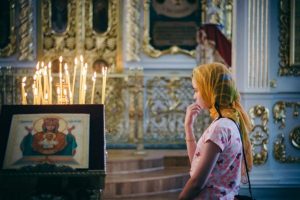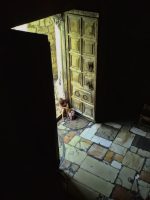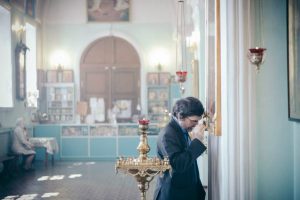I had a very interesting (and positive) experience giving a talk on icons and Church history at a local Catholic Jr. High School, recently. Before I went in I had to do a sort of super-man in the telephone booth change into my clerical collar and suit jacket in my car (I had worn the wore my clerical shirt to the secular school I work at under an innocuous sweater). This quick change made me think of the sad fact that believers often have to (or choose to) cover up their faith in the “real” world.
Now, in my case wearing a clergy shirt and collar to my secular job would not be appropriate, but the symbolism behind making that change is compelling. I’ve just read a book by Tatiana Goricheva describing her conversion in what was then Soviet Russia. She experienced harassment from the KGB and was finally expelled from the USSR just before the 1980 Moscow Olympics. While she was exiled to Western Europe she was appalled by how empty the spiritual life of “free” people was–even churchgoers and clergy.

Photo: orthphoto.net
Compared to Russia, where the Church was under extreme stress from the Communist government, the western churches had absolute freedom. Yet, in Russia under police harassment, believers felt as if they were the freest of all people. Their lives had been re-deemed from the empty meaninglessness of atheism and filled with the light of Christ. Whereas, in Western Europe (and America), even believers were infected by the meaninglessness of consumerism. Well dressed and well fed, churchgoers were often treated to pabulum sermons by priests who were more concerned with fitting in and entertaining their parishioners than with preaching the gospel. T. Goricheva’s analysis of Christianity in the “free” world is devastatingly accurate.
Why is it that we, who are so free with other things, are embarrassed to show their faith in public? Why are we so tempted to hide the light that sustains us under a bushel? In doing so, we ultimately extinguish it in ourselves. We live in a strange and terrible society where it is perfectly acceptable to parade the most shameful and perverted things in public while the Gospel of Jesus Christ is kept as a dirty secret! And the saddest thing of all is that millions are starving to hear the good news of salvation, to hear that there is hope in the midst of despair and a Light that can overcome any darkness. Many of today’s young people, who are being told that their broken lives are perfectly OK as they are, are, in reality, desperate for an alternative. But, they do not hear of that alternative, the alternative of Orthodox Christianity, because our voice is lost. Our churches are consumed with their own little congregational concerns, our priests are often overburdened with the need to hold down secular jobs, and our hierarchy is divided into hostile ethnic camps— each with their own agenda. Perhaps our embarrassment to bear public witness to our faith is grounded in the fear that should anyone actually pay attention to us they will see how empty and vapid we are. And, yet, we are taught in the Gospel that if we are ashamed of Christ, He will be ashamed of us (9:26) when He returns in glory.
What is the solution? It is never easy, but often simple. We, each and every one of us and all of us together need to return to our “first love”, that is, to Jesus Christ. He is the very core of our faith, our Savior, Who with the Father and the Holy Spirit is our God. Our love for Him is but a pale reflection of His love for us, yet, even that pale reflection will shine as a bright light in today’s world. In this Holy Lenten season, let’s make an effort to show that light to those around us—gently, but persistently. One of the most striking things in Tatiana Goricheva’s book was her description of how those who were converted to Orthodoxy were changed from anxious, fearful, despairing individuals into human beings who were serene and filled with joyous love, even in the face of persecution. The great mystery of “dying” to this world in order to “rise again” is part of our baptismal covenant. If we live for ourselves, we live in anxiety and fear; if we live for Christ, we are freed to love and delivered from fear. St. Paul expressed this mystery perfectly when he wrote:
“For the love of Christ compels us, because we judge thus: that if One died for all, then all died; and He died for all, that those who live should live no longer for themselves, but for Him who died for them and rose again.” (2 Corinthians 5:14-15)
Source: St. Nicholas Orthodox Church
















